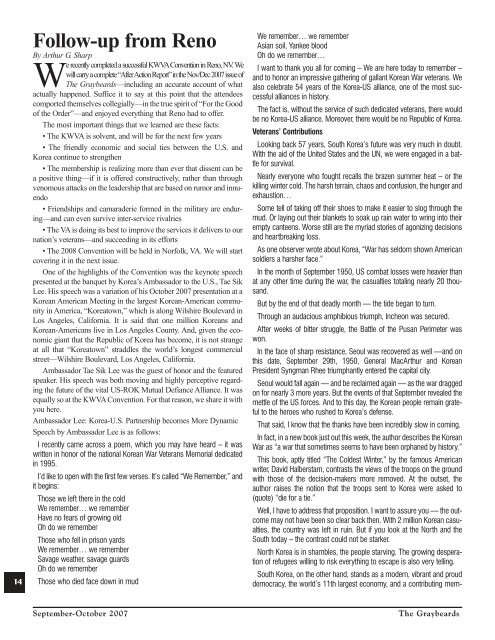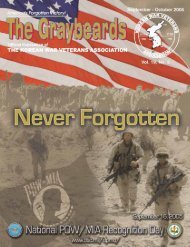The Complete Issue - Korean War Veterans Association
The Complete Issue - Korean War Veterans Association
The Complete Issue - Korean War Veterans Association
You also want an ePaper? Increase the reach of your titles
YUMPU automatically turns print PDFs into web optimized ePapers that Google loves.
14<br />
Follow-up from Reno<br />
By Arthur G. Sharp<br />
We recently completed a successful KWVA Convention in Reno, NV. We<br />
will carry a complete “After Action Report” in the Nov/Dec 2007 issue of<br />
<strong>The</strong> Graybeards—including an accurate account of what<br />
actually happened. Suffice it to say at this point that the attendees<br />
comported themselves collegially—in the true spirit of “For the Good<br />
of the Order”—and enjoyed everything that Reno had to offer.<br />
<strong>The</strong> most important things that we learned are these facts:<br />
• <strong>The</strong> KWVA is solvent, and will be for the next few years<br />
• <strong>The</strong> friendly economic and social ties between the U.S. and<br />
Korea continue to strengthen<br />
• <strong>The</strong> membership is realizing more than ever that dissent can be<br />
a positive thing—if it is offered constructively, rather than through<br />
venomous attacks on the leadership that are based on rumor and innuendo<br />
• Friendships and camaraderie formed in the military are enduring—and<br />
can even survive inter-service rivalries<br />
• <strong>The</strong> VA is doing its best to improve the services it delivers to our<br />
nation’s veterans—and succeeding in its efforts<br />
• <strong>The</strong> 2008 Convention will be held in Norfolk, VA. We will start<br />
covering it in the next issue.<br />
One of the highlights of the Convention was the keynote speech<br />
presented at the banquet by Korea’s Ambassador to the U.S., Tae Sik<br />
Lee. His speech was a variation of his October 2007 presentation at a<br />
<strong>Korean</strong> American Meeting in the largest <strong>Korean</strong>-American community<br />
in America, “Koreatown,” which is along Wilshire Boulevard in<br />
Los Angeles, California. It is said that one million <strong>Korean</strong>s and<br />
<strong>Korean</strong>-Americans live in Los Angeles County. And, given the economic<br />
giant that the Republic of Korea has become, it is not strange<br />
at all that “Koreatown” straddles the world’s longest commercial<br />
street—Wilshire Boulevard, Los Angeles, California.<br />
Ambassador Tae Sik Lee was the guest of honor and the featured<br />
speaker. His speech was both moving and highly perceptive regarding<br />
the future of the vital US-ROK Mutual Defiance Alliance. It was<br />
equally so at the KWVA Convention. For that reason, we share it with<br />
you here.<br />
Ambassador Lee: Korea-U.S. Partnership becomes More Dynamic<br />
Speech by Ambassador Lee is as follows:<br />
I recently came across a poem, which you may have heard – it was<br />
written in honor of the national <strong>Korean</strong> <strong>War</strong> <strong>Veterans</strong> Memorial dedicated<br />
in 1995.<br />
I’d like to open with the first few verses. It’s called “We Remember,” and<br />
it begins:<br />
Those we left there in the cold<br />
We remember… we remember<br />
Have no fears of growing old<br />
Oh do we remember<br />
Those who fell in prison yards<br />
We remember… we remember<br />
Savage weather, savage guards<br />
Oh do we remember<br />
Those who died face down in mud<br />
We remember… we remember<br />
Asian soil, Yankee blood<br />
Oh do we remember…<br />
I want to thank you all for coming – We are here today to remember –<br />
and to honor an impressive gathering of gallant <strong>Korean</strong> <strong>War</strong> veterans. We<br />
also celebrate 54 years of the Korea-US alliance, one of the most successful<br />
alliances in history.<br />
<strong>The</strong> fact is, without the service of such dedicated veterans, there would<br />
be no Korea-US alliance. Moreover, there would be no Republic of Korea.<br />
<strong>Veterans</strong>’ Contributions<br />
Looking back 57 years, South Korea’s future was very much in doubt.<br />
With the aid of the United States and the UN, we were engaged in a battle<br />
for survival.<br />
Nearly everyone who fought recalls the brazen summer heat – or the<br />
killing winter cold. <strong>The</strong> harsh terrain, chaos and confusion, the hunger and<br />
exhaustion…<br />
Some tell of taking off their shoes to make it easier to slog through the<br />
mud. Or laying out their blankets to soak up rain water to wring into their<br />
empty canteens. Worse still are the myriad stories of agonizing decisions<br />
and heartbreaking loss.<br />
As one observer wrote about Korea, “<strong>War</strong> has seldom shown American<br />
soldiers a harsher face.”<br />
In the month of September 1950, US combat losses were heavier than<br />
at any other time during the war, the casualties totaling nearly 20 thousand.<br />
But by the end of that deadly month — the tide began to turn.<br />
Through an audacious amphibious triumph, Incheon was secured.<br />
After weeks of bitter struggle, the Battle of the Pusan Perimeter was<br />
won.<br />
In the face of sharp resistance, Seoul was recovered as well —and on<br />
this date, September 29th, 1950, General MacArthur and <strong>Korean</strong><br />
President Syngman Rhee triumphantly entered the capital city.<br />
Seoul would fall again — and be reclaimed again — as the war dragged<br />
on for nearly 3 more years. But the events of that September revealed the<br />
mettle of the US forces. And to this day, the <strong>Korean</strong> people remain grateful<br />
to the heroes who rushed to Korea’s defense.<br />
That said, I know that the thanks have been incredibly slow in coming.<br />
In fact, in a new book just out this week, the author describes the <strong>Korean</strong><br />
<strong>War</strong> as “a war that sometimes seems to have been orphaned by history.”<br />
This book, aptly titled “<strong>The</strong> Coldest Winter,” by the famous American<br />
writer, David Halberstam, contrasts the views of the troops on the ground<br />
with those of the decision-makers more removed. At the outset, the<br />
author raises the notion that the troops sent to Korea were asked to<br />
(quote) “die for a tie.”<br />
Well, I have to address that proposition. I want to assure you — the outcome<br />
may not have been so clear back then. With 2 million <strong>Korean</strong> casualties,<br />
the country was left in ruin. But if you look at the North and the<br />
South today – the contrast could not be starker.<br />
North Korea is in shambles, the people starving. <strong>The</strong> growing desperation<br />
of refugees willing to risk everything to escape is also very telling.<br />
South Korea, on the other hand, stands as a modern, vibrant and proud<br />
democracy, the world’s 11th largest economy, and a contributing mem-<br />
September-October 2007<br />
<strong>The</strong> Graybeards

















